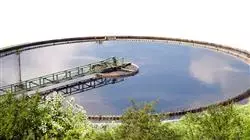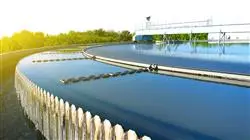University certificate
The world's largest faculty of engineering”
Introduction to the Program
Thanks to this exclusive Postgraduate diploma you will contribute to the sustainability of the planet by providing innovative solutions in wastewater treatment"

There are several reasons why water ends up being a limited resource for some societies. One of them is wastewater which, not having the appropriate treatment, cannot be reused precisely to avoid indiscriminate consumption, so this practice is resorted to as in crop irrigation, industrial processes, among others. This is where the concept of purification comes in. Engineers have been working on appropriate processes for the purification of wastewater, conducting studies for the creation of new techniques for such action with the application of innovative technologies, also avoiding the spread of diseases.
With this Postgraduate diploma, the students, in addition to broadening their knowledge in specific aspects, will also be able to strengthen their competences to an approach guided to the global management of the field of study. That is why you will have all the tools according to the demands of the international market. This program will provide the most exclusive updates on Water Treatment Infrastructures and the deepening of concepts such as sanitation and urban drainage networks.
In the development of this program, the graduates will progress in important and specific criteria related to the approach of solutions to flooding problems in cities based on rainwater retention tanks and everything related to the sustainable urban drainage system. This through a specialized teaching team, in addition to an audiovisual support with high quality content, to offer dynamism in the academic process.
This 100% online Postgraduate diploma is designed to provide flexibility and convenience in the study process, accessing the sessions at the time that is most convenient for you without having the obligation to attend in person at a fixed schedule. In this way, you will only need an electronic device with Internet connection, a current modality that guarantees excellence and the positioning of the engineers in a high demand sector.
With TECH you will be able to expand your knowledge towards the application of technologies in wastewater treatment techniques"
This Postgraduate diploma in Water Treatment Infrastructures contains the most complete and up-to-date program on the market. The most important features include:
- The development of case studies presented by experts in Civil Engineering focused on Water Treatment Infrastructures
- Graphic, schematic, and practical contents with which they are created, provide scientific and practical information on the disciplines that are essential for professional practice
- Practical exercises where self-assessment can be used to improve learning
- Its special emphasis on innovative methodologies
- Theoretical lessons, questions to the expert, debate forums on controversial topics, and individual reflection assignments
- Content that is accessible from any fixed or portable device with an Internet connection
With this program you will deepen your knowledge of concepts such as sanitation and urban drainage networks through 450 hours of the best theoretical, practical and additional content"
The program’s teaching staff includes professionals from sector who contribute their work experience to this educational program, as well as renowned specialists from leading societies and prestigious universities.
Its multimedia content, developed with the latest educational technology, will provide the professionals with situated and contextual learning, i.e., a simulated environment that will provide an immersive education programmed to learn in real situations.
The design of this program focuses on Problem-Based Learning, by means of which the professionals must try to solve the different professional practice situations that are presented throughout the academic course. For this purpose, the students will be assisted by an innovative interactive video system created by renowned experts.
The graduates will reinforce criteria related to the approach of solutions to flooding problems based on rainwater retention reservoirs"

This 100% online Postgraduate diploma guarantees the excellence and positioning of the engineers in a high demand sector”
Why study at TECH?
TECH is the world’s largest online university. With an impressive catalog of more than 14,000 university programs available in 11 languages, it is positioned as a leader in employability, with a 99% job placement rate. In addition, it relies on an enormous faculty of more than 6,000 professors of the highest international renown.

Study at the world's largest online university and guarantee your professional success. The future starts at TECH”
The world’s best online university according to FORBES
The prestigious Forbes magazine, specialized in business and finance, has highlighted TECH as “the world's best online university” This is what they have recently stated in an article in their digital edition in which they echo the success story of this institution, “thanks to the academic offer it provides, the selection of its teaching staff, and an innovative learning method aimed at educating the professionals of the future”
A revolutionary study method, a cutting-edge faculty and a practical focus: the key to TECH's success.
The most complete study plans on the university scene
TECH offers the most complete study plans on the university scene, with syllabuses that cover fundamental concepts and, at the same time, the main scientific advances in their specific scientific areas. In addition, these programs are continuously being updated to guarantee students the academic vanguard and the most in-demand professional skills. In this way, the university's qualifications provide its graduates with a significant advantage to propel their careers to success.
TECH offers the most comprehensive and intensive study plans on the current university scene.
A world-class teaching staff
TECH's teaching staff is made up of more than 6,000 professors with the highest international recognition. Professors, researchers and top executives of multinational companies, including Isaiah Covington, performance coach of the Boston Celtics; Magda Romanska, principal investigator at Harvard MetaLAB; Ignacio Wistumba, chairman of the department of translational molecular pathology at MD Anderson Cancer Center; and D.W. Pine, creative director of TIME magazine, among others.
Internationally renowned experts, specialized in different branches of Health, Technology, Communication and Business, form part of the TECH faculty.
A unique learning method
TECH is the first university to use Relearning in all its programs. It is the best online learning methodology, accredited with international teaching quality certifications, provided by prestigious educational agencies. In addition, this disruptive educational model is complemented with the “Case Method”, thereby setting up a unique online teaching strategy. Innovative teaching resources are also implemented, including detailed videos, infographics and interactive summaries.
TECH combines Relearning and the Case Method in all its university programs to guarantee excellent theoretical and practical learning, studying whenever and wherever you want.
The world's largest online university
TECH is the world’s largest online university. We are the largest educational institution, with the best and widest online educational catalog, one hundred percent online and covering the vast majority of areas of knowledge. We offer a large selection of our own degrees and accredited online undergraduate and postgraduate degrees. In total, more than 14,000 university degrees, in eleven different languages, make us the largest educational largest in the world.
TECH has the world's most extensive catalog of academic and official programs, available in more than 11 languages.
Google Premier Partner
The American technology giant has awarded TECH the Google Google Premier Partner badge. This award, which is only available to 3% of the world's companies, highlights the efficient, flexible and tailored experience that this university provides to students. The recognition as a Google Premier Partner not only accredits the maximum rigor, performance and investment in TECH's digital infrastructures, but also places this university as one of the world's leading technology companies.
Google has positioned TECH in the top 3% of the world's most important technology companies by awarding it its Google Premier Partner badge.
The official online university of the NBA
TECH is the official online university of the NBA. Thanks to our agreement with the biggest league in basketball, we offer our students exclusive university programs, as well as a wide variety of educational resources focused on the business of the league and other areas of the sports industry. Each program is made up of a uniquely designed syllabus and features exceptional guest hosts: professionals with a distinguished sports background who will offer their expertise on the most relevant topics.
TECH has been selected by the NBA, the world's top basketball league, as its official online university.
The top-rated university by its students
Students have positioned TECH as the world's top-rated university on the main review websites, with a highest rating of 4.9 out of 5, obtained from more than 1,000 reviews. These results consolidate TECH as the benchmark university institution at an international level, reflecting the excellence and positive impact of its educational model.” reflecting the excellence and positive impact of its educational model.”
TECH is the world’s top-rated university by its students.
Leaders in employability
TECH has managed to become the leading university in employability. 99% of its students obtain jobs in the academic field they have studied, within one year of completing any of the university's programs. A similar number achieve immediate career enhancement. All this thanks to a study methodology that bases its effectiveness on the acquisition of practical skills, which are absolutely necessary for professional development.
99% of TECH graduates find a job within a year of completing their studies.
Postgraduate Diploma in Water Treatment Infrastructures
Nowadays, the preservation of our water resources and the care of the environment are crucial issues. Wastewater treatment is presented as a fundamental tool to reduce the impact of human activity on aquatic ecosystems and safeguard public health. If you want to immerse yourself in the exciting world of techniques and technologies for wastewater treatment and purification, you are in the right place. TECH Global University has developed a complete Postgraduate Diploma in Water Treatment Infrastructures, in which we will provide you with comprehensive training that will allow you to understand, design and manage efficient and sustainable wastewater treatment and sanitation systems. Through this program, you will understand the relevance of keeping the hydrological cycle in balance and you will learn to apply the most advanced technologies for the adequate treatment of contaminated water. In addition, you will explore the best management and maintenance practices to ensure the durability and functionality of wastewater treatment plants.
Be an expert in water treatment infrastructures
To make this training a unique and easily accessible experience, we have structured all classes in a 100% online format, where you will be able to flexibly schedule them according to your needs and have at your disposal state-of-the-art multimedia content. As you progress through the program, you will learn the theoretical and legal foundations that support wastewater treatment. In addition, you will analyze the importance of treated effluents and their responsible reuse, as well as the techniques to identify and quantify the pollutants present in wastewater, which will allow you to design effective and customized treatment systems. You will also study in detail the different treatment methods, from conventional processes to the most advanced technologies (bioremediation and disinfection). Finally, you will learn the design criteria and operational aspects that ensure the efficiency and safety of treatment facilities. At the end of the program, you will be prepared to face professional challenges in the field of wastewater treatment.







